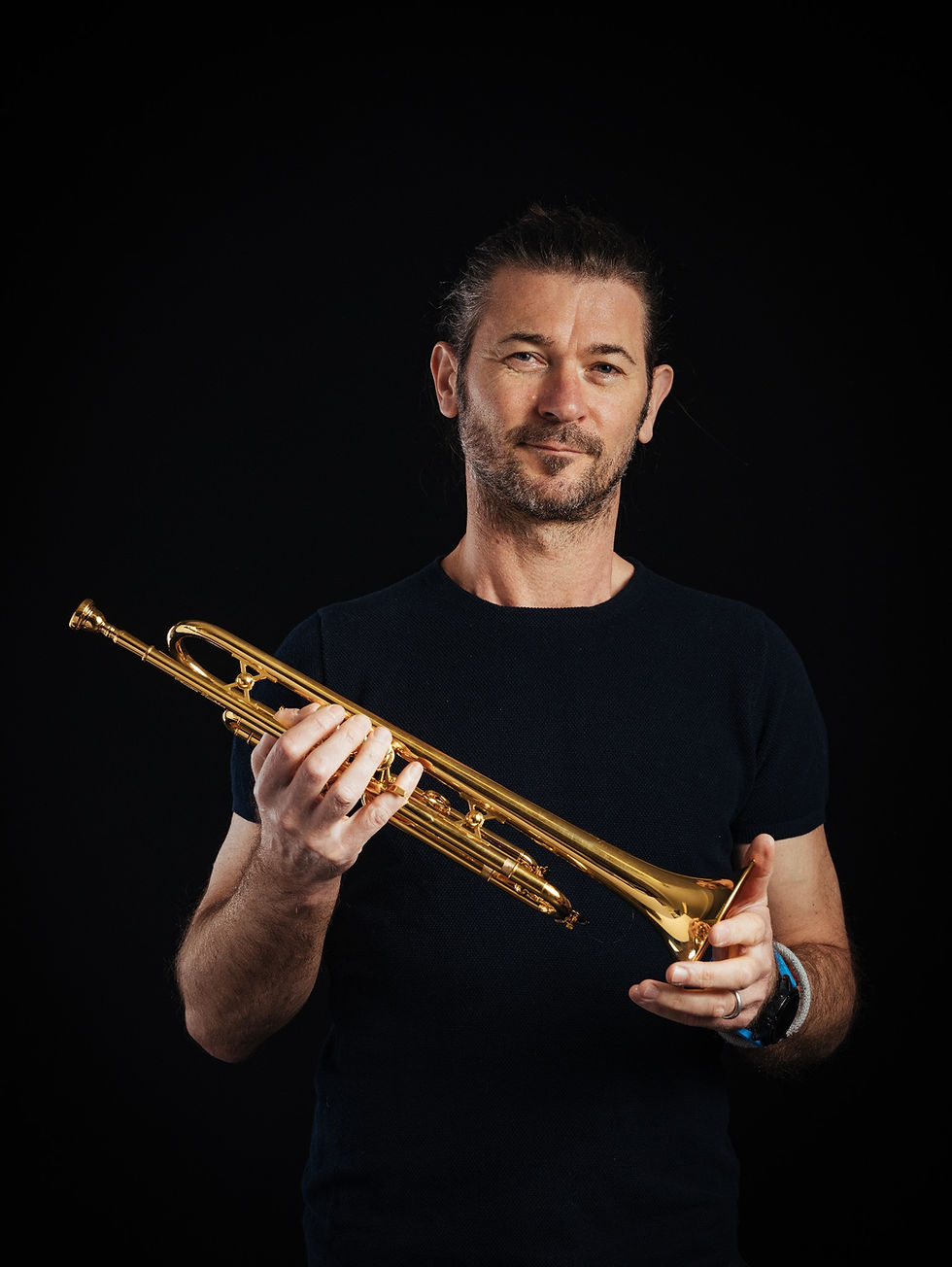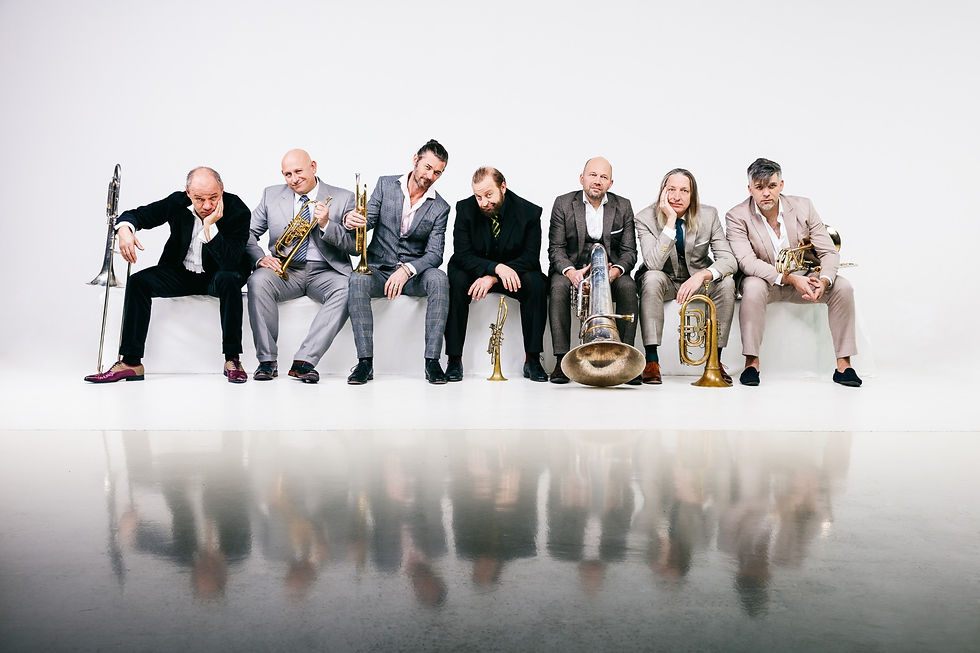Roman Rindberger Interview
- Görkem Çavuş
- Sep 3, 2024
- 5 min read

1. How would you consider joining the Mnozil Brass ensemble as one of the turning points in your musical career? How did this experience affect your musical identity?
Mnozil Brass completely changed my musical career.I studied classical trumpet, won several scholarships and achieved my goal of professionally playing trumpet in the orchestra.I never thought I would find my future career in a brass ensemble.Being self-employed has changed my image of creativityand artistic identity a lot. You can never rest on your success, you always have to do something about it. And that makes you thrive!
2. Can you talk about your experience working in different musical styles? What perspectives have you gained from working with a wide repertoire ranging from baroque music to contemporary and experimental compositions?
Mnozil Brass is of course not a "normal" ensemble. And that's why I had the chance there to gain experience far beyond the "classical" repertoire. The chance to work with musicians who themselves had a completely different specialization - such as Thomas Gansch in jazz or Leonhard Paul in early music, among others - was a very fruitful basis for expanding my repertoire and, above all, my stylistic versatility at a high level.
Basically, I'm just very interested in getting to know new styles or musical genres, so it always remains exciting.
3. As an orchestral trumpeter, you have worked in various orchestras for many years. Which of these experiences have influenced you the most and what have you learned?
Follow your dreams, follow your music! When I played Gustav Mahler's 5th Symphony on tour for the first time in one of the big international Youth Orchestras, from Amsterdam and Berlin to Helsinki, St. Petersburg and Moscow, I simply knew that I wanted to do this for a living! That is the reason why I am a musician today - all my musical experiences have always nurtured this motivation. I am very grateful for that!
I was in the fortunate position of being able to meet fantastic teachers and conductors of our time. There I learned what real artistic quality means and the power of really well-performed music.Sometimes you have to be uncompromising. It's not always easy - but it's very worthwhile!
4. What methods do you use with your students in your teaching career and what kind of music education do you give them? What strategies would you recommend for them to achieve success, especially in auditions and international competitions?
In addition to my work with Mnozil Brass and my teaching activities at university, I completed several training courses.I am convinced these are helpful and supportive for my life as a person and musician.The most important were studying in the field of mental training, the Wim Hof method and Oxygen Advantage.Of course I use these methods in my work as a teacher - sometimes more, sometimes less. It always depends on the individual student.
I have developed various protocols with these methods to give students a structured way to practice and perform successfully.Basically, when I work with my musicians, I try to find out how I can best support them on their individual path. As a result, their journey can often go in different directions than they could have imagined at the beginning of their studies and their boundaries shift.
The most important thing, however, is to give them the motivation to grow as musicians and personalities. For those who learn to appreciate the joy of personal growth, there are many goals - but actually no more limits.
5. What do you think about the effects of music on mental and physical health? In particular, what is the importance of methods such as the Wim Hof Method and Oxygen Advantage for musicians?
Music is a universal language, not only for musicians - this often sounds a bit banal, but it is not only a philosophical but above all a neurological fact. With Mnozil Brass in particular, we experience so much connection with other people and cultures through our music. It's really fascinating!
Music is able to connect us all. And connection is one of the most important human needs.There is no simpler and more understandable way to do this than music. Apart from music, we can also connect to ourselves - to our inner selves - using methods such as Wim Hof or Oxygen Advantage. Our lives today are very much determined by stimuli from the outside, whether social media, work or entertainment.
Personal introspection often falls by the wayside and this sometimes separates us from ourselves.In my opinion, finding yourself as a person and artist is one of the most important steps you should take.
6. What is the biggest challenge in your music career and how did you overcome it?
The biggest challenge when I was young was certainly overcoming my crisis with the trumpet.At the age of 19, I couldn't play properly at all for 1.5 years. It was only through years of working and analyzing what I was doing right or wrong that I managed to find my way into a doable career with the trumpet. Today, I can reflect this well in my lessons and I'm pleased that I get a lot of positive feedback.
Today, my biggest challenge is balancing my whole life. Family, playing, teaching and sports all have an important place in my life. It is sometimes impossibleto give all areas enough space.
But family always comes first, there's no doubt about that.
7. How do you find a balance between your stage performances and your work in the recording studio? What do you like most about your stage performances and what aspects do you enjoy the most when working in the recording studio?
In recent years, Mnozil Brass has no longer produced so much in the studio, but mostly live on stage. To capture the energy and power of our playing, we need the audience.It's very difficult in the studio to create the immediate energy that arises when we play for our fans.
Studio work has an incredible appeal when you have enough time and opportunities to let creative ideas develop and then preserve them. On stage, it's always about the moment and taking full risks when playing. That's a lot of fun!
8. Do you have any future plans to continue your music education or focus on other projects? What kind of a roadmap do you draw for the progression and growth of your music career?
First of all i am very grateful to go on playing with Mnozil Brass. We will continue to try to stay innovative and surprise with new ideas!I'm really looking forward to working at the MUK Vienna and my masterclasses and courses. I want to focus a bit more on my teaching and continue to look for interesting ways to facilitate personal growth for my trumpet playing, myself as a person and my students.




Comments